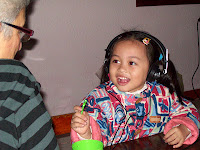The vision from the very start of our Vietnam Deaf Education program has been to empower professionals and families with the expertise to help children with hearing loss – and then be prepared to train each other. The sharing of knowledge and application of that knowledge amongst the Vietnamese is what makes our efforts valuable and sustainable.
Yesterday, I met an organization that shares that same aspiration for empowering others. Education For Development (EFD) works with Vietnamese partners, offering capacity-building resources and support to help them develop and effectively provide direct service to disadvantaged children. Local Vietnamese organizations submit project proposals to EFD each year from which EFD chooses to support. Much of their work centers around providing funding and resources for training, management support, and infrastructure.
There is presently a strong interest from the special education community for more professional development and training around early intervention for children with disabilities. EFD is funding a project to facilitate knowledge sharing amongst Vietnamese professionals working in this field, including those who work with children who are deaf or hard of hearing. There are three schools in our Vietnam Deaf Education Program that are involved with this EFD project and we discussed a number of ways that we might collaborate to expand the reach of our work while also perpetuating the learning derived from our program. I look forward to continuing discussions with EFD to build on our ideas.
I arrived in Hanoi last night and am looking forward to meetings over the next few days with UNICEF and other l arge global organizations. Vietnam’s health department is focused on natal screening and early childhood health. Meanwhile, Vietnam’s education department continues to support inclusive education for children with disabilities and early intervention programs. So the time is ripe for us to increase awareness and support for what is possible when young children with hearing loss have access to the early identification, hearing technology, and the trained professionals they need to succeed.
arge global organizations. Vietnam’s health department is focused on natal screening and early childhood health. Meanwhile, Vietnam’s education department continues to support inclusive education for children with disabilities and early intervention programs. So the time is ripe for us to increase awareness and support for what is possible when young children with hearing loss have access to the early identification, hearing technology, and the trained professionals they need to succeed.